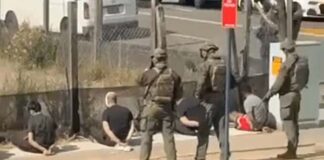ON OCTOBER 6 Palm Island man Lex Wotton faced the Supreme Court in Queensland. He is charged with “riot involving damage or destruction of property”. If convicted he faces life imprisonment.
Wotton’s charges stem from the protest on Palm Island in the wake of Mulrunji Doomadgee’s death on November 19 2004. The Deputy Coroner later ruled that Senior Sergeant Chris Hurley was responsible for Mulrunji’s death.
Hurley became the first police officer in Australian history to face trial over a black death in custody. Hurley walked free, in highly controversial circumstances after the earlier ruling by the Deputy Coroner, while Wotton, who is not responsible for any deaths, faces life in prison. Others have served time for taking a stand against the police on Palm Island.
Mulrunji’s death in custody
On November 19 2004 Mulrunji Doomadgee, 36, was brutally bashed in custody and later died after being dragged unconscious to his cell at Palm Island police station. He was arrested for being drunk and causing a nuisance.
There was an investigation into the death immediately. One of the leading investigators was Detective Senior Sergeant Darren Robinson, a close friend of Hurley.
During the day after the killing, Hurley was allowed to speak one on one with all of the six major witnesses, both police and civilians. Hurley then had Detectives Robinson and Raymond Kitching, the other investigating officer, over for dinner that night.
On November 26 Palm Island mayor Erykah Kyle called a public meeting hoping to present the autopsy report and provide some answers to the community, who so far had been left in the dark. Hundreds of people gathered to hear how Mulrunji died.
The autopsy report was a whitewash. The meeting heard of the people of the injuries Mulrunji suffered and the death described as a “fall” and an “accident”.
The crowd was seething over yet another death in custody, and angry at having to wait almost a week for answers. They wanted justice. A spontaneous protest began—after which the police station, courthouse and Hurley’s home had all been burnt down.
The protest on Palm Island led to a huge uproar and a state inquiry in Mulrunji’s death was set up.
State Coroner Michael Barnes stood down from the inquiry after claims of bias. As the head of the Crime and Misconduct Commission Barnes had cleared Hurley of previous complaints of violence in several other remote communities.
In September 2006 Deputy Coroner Christine Clements found Hurley responsible for Mulrunji’s fatal injuries. Despite this finding, the head of the Department of Public Prosecutions (DPP) Leanne Clare refused to press charges against Hurley, calling the murder of Mulrunji “a tragic accident”.
Bowing to mounting public pressure, including a number of large demonstrations in Brisbane, the Beattie Government brought in Sir Lawrence Street to review the DPP’s decision.
Street decided Hurley should face trial for manslaughter. It was not until this decision on January 26 2007 that Hurley was actually suspended from active duty.
Hurley was tried by an all white jury in Townsville and found not guilty. The government “prosecution” did not call a single eyewitness who was in the watch house on the day Mulrunji died.
Hurley admitted under questioning that he was responsible for Mulrunji’s death.
Despite this admission, Hurley’s lawyers are appealing to the Supreme Court in Townsville to rescind Christine Clements’ original judgement that Hurley was responsible for Mulrunji’s death.
Campaigning to drop the charges
While Hurley is compensated for his “time off” and is free to resume his life (and career), many of those who took a stand against police brutality on Palm Island face jail or are currently serving sentences.
Mother of four Alissa Norman was jailed for three months for supposedly throwing a rock in the general direction of the Palm Island police station and Alfred Kidner was sentenced to 16 months in jail. Others charged after the protest were acquitted in March 2007 after it was revealed the police had no evidence against them.
The Queensland Government and the DPP are attempting to make an example of Wotton for his part in protesting the police’s role in the death of Mulrunji Doomadgee.
Protestors converged outside the court on the first day of Wotton’s trial in early October. We must recapture the mood of the campaign that brought Hurley to trial to stop the government victimising yet another Aboriginal leader.
Black deaths in custody remain a huge issue in Aboriginal communities and activists should not be punished for taking a stand against racism and police brutality.
By Robert Nicholas





